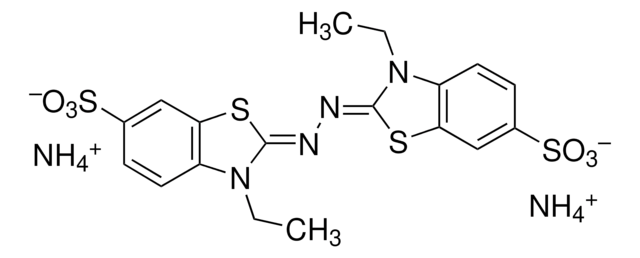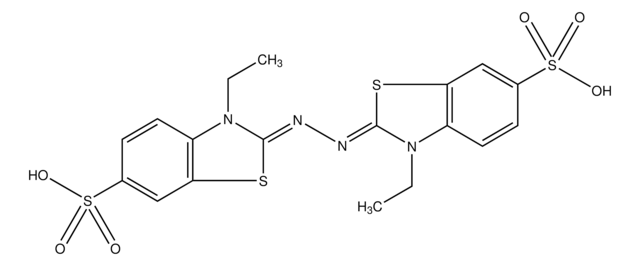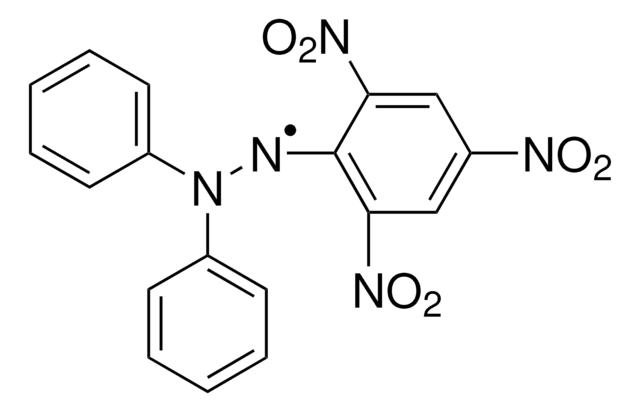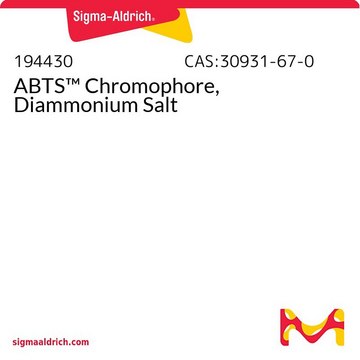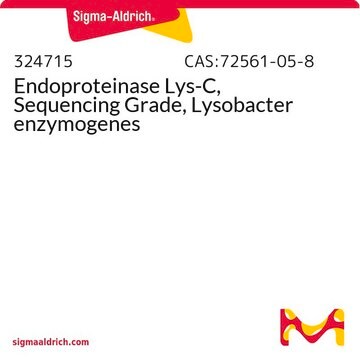11204530001
Roche
ABTS™ Buffer
solution, pkg of 125 mL
Synonyme(s) :
buffer
Se connecterpour consulter vos tarifs contractuels et ceux de votre entreprise/organisme
About This Item
Code UNSPSC :
12352204
Produits recommandés
Forme
solution
Niveau de qualité
Conditionnement
pkg of 125 mL
Fabricant/nom de marque
Roche
Conditions d'expédition
wet ice
Température de stockage
2-8°C
Description générale
2,2′-azino-di-(3-ethylbenzthiazoline sulfonic acid) or ABTS acts as a substrate for HRP (horseradish peroxidase) conjugate during enzyme-linked immunosorbent assay (ELISA). It is the most sensitive, and stable substrate when compared to three other substrates namely, 5-aminosalicylic acid (5AS), O-phenylenediamine (OPD), O-tolidine (OT). It also produces the best visual results, where it gives a bluish-green color. ELISA using ABTS is a highly sensitive, specific and reproducible technique.
Application
ABTS Buffer is a solvent for ABTS. ABTS solution is the ideal substrate solution for enzyme immunoassays with horseradish peroxidase (HRP) as a marker enzyme. Because of the high sensitivity of the reaction, autoreaders will often display "over" after several minutes.
Notes préparatoires
Working concentration: Flow cytometry: 0.5 μg/100 μl (106 cells); Immunohistocytochemistry: 50 μg/ml
Working concentration of conjugate depends on application and substrate. Concentrations should be taken as a guideline.
Working solution: Dissolve one ABTS tablet (5 mg) in 5 ml of ABTS buffer. This solution has a light-green color. In microtiter plates, the solution is colorless A405 nm/1 cm should be <0.16. Work as clean as possible. Heavy metal ions or traces of peroxidase can produce a dark green ABTS solution. Such solutions are not suitable for the assay.
Working concentration of conjugate depends on application and substrate. Concentrations should be taken as a guideline.
Working solution: Dissolve one ABTS tablet (5 mg) in 5 ml of ABTS buffer. This solution has a light-green color. In microtiter plates, the solution is colorless A405 nm/1 cm should be <0.16. Work as clean as possible. Heavy metal ions or traces of peroxidase can produce a dark green ABTS solution. Such solutions are not suitable for the assay.
Autres remarques
For life science research only. Not for use in diagnostic procedures.
Informations légales
ABTS is a trademark of Roche
Classe de danger pour l'eau (WGK)
nwg
Point d'éclair (°F)
No data available
Point d'éclair (°C)
No data available
Certificats d'analyse (COA)
Recherchez un Certificats d'analyse (COA) en saisissant le numéro de lot du produit. Les numéros de lot figurent sur l'étiquette du produit après les mots "Lot" ou "Batch".
Déjà en possession de ce produit ?
Retrouvez la documentation relative aux produits que vous avez récemment achetés dans la Bibliothèque de documents.
Les clients ont également consulté
C Lindenthal et al.
Infection and immunity, 69(1), 52-57 (2000-12-19)
Enterotoxigenic Escherichia coli (ETEC) is capable of invading epithelial cell lines derived from the human ileum and colon. Two separate invasion loci (tia and tib) that direct noninvasive E. coli strains to adhere to and invade cultured human intestine epithelial
Patrik Erlmann et al.
Molecular biology of the cell, 20(20), 4400-4411 (2009-08-28)
Deleted in Liver Cancer 1 (DLC1) is a GTPase-activating protein (GAP) with specificity for RhoA, RhoB, and RhoC that is frequently deleted in various tumor types. By inactivating these small GTPases, DLC1 controls actin cytoskeletal remodeling and biological processes such
H Matsuda et al.
The Japanese journal of experimental medicine, 54(3), 131-138 (1984-06-01)
A micro-technique of enzyme-linked immunosorbent assay (ELISA) using ABTS, 2,2'-azino-di-(3-ethylbenzthiazoline sulfonic acid), as a substrate for horseradish peroxidase (HRP) conjugate was studied. In a comparative study among 4 substrates, namely; 5-aminosalicylic acid (5AS), O-phenylenediamine (OPD), O-tolidine (OT) and ABTS, for
Bruce S Sachais et al.
Blood, 120(5), 1137-1142 (2012-05-12)
Rapid laboratory assessment of heparin-induced thrombocytopenia (HIT) is important for disease recognition and management. The utility of contemporary immunoassays to detect antiplatelet factor 4 (PF4)/heparin antibodies is hindered by detection of antibodies unassociated with disease. To begin to distinguish properties
Notre équipe de scientifiques dispose d'une expérience dans tous les secteurs de la recherche, notamment en sciences de la vie, science des matériaux, synthèse chimique, chromatographie, analyse et dans de nombreux autres domaines..
Contacter notre Service technique
